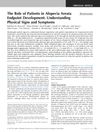 2 citations,
July 2023 in “Journal of cosmetic dermatology”
2 citations,
July 2023 in “Journal of cosmetic dermatology” JAK inhibitors are more effective and safer for treating alopecia areata than dupilumab and apremilast.
 1 citations,
April 2018 in “The journal of investigative dermatology/Journal of investigative dermatology”
1 citations,
April 2018 in “The journal of investigative dermatology/Journal of investigative dermatology” Oral tofacitinib significantly improves lichen planopilaris symptoms without adverse effects.
April 2017 in “The journal of investigative dermatology/Journal of investigative dermatology” Researchers found three different ways drugs work to treat hair loss from alopecia areata and identified key factors for personalized treatment.
 3 citations,
June 2023 in “Journal of cosmetic dermatology”
3 citations,
June 2023 in “Journal of cosmetic dermatology” A new drug, abrocitinib, helped a child with severe hair loss regrow hair.
 1 citations,
January 2023 in “Przegląd Dermatologiczny”
1 citations,
January 2023 in “Przegląd Dermatologiczny” The Polish Society of Dermatology recommends treatments for alopecia areata that vary by severity, including topical and systemic medications, with long-term maintenance important for management.
 May 2024 in “Journal of cosmetic dermatology”
May 2024 in “Journal of cosmetic dermatology” Tofacitinib is an effective and safe treatment for alopecia areata.

Baricitinib quickly improved severe alopecia areata, with almost total hair regrowth in three months.
 1 citations,
March 2023 in “Clinical, Cosmetic and Investigational Dermatology”
1 citations,
March 2023 in “Clinical, Cosmetic and Investigational Dermatology” Current treatments for Alopecia Areata have mixed success, and there's a need for better, more accessible options and support for affected individuals.
48 citations,
April 2021 in “Journal of the American Academy of Dermatology” Topical corticosteroids are the best initial treatment for children's alopecia areata.
 23 citations,
September 2019 in “Journal of The American Academy of Dermatology”
23 citations,
September 2019 in “Journal of The American Academy of Dermatology” Tofacitinib and oral minoxidil together effectively regrow hair in severe alopecia areata patients.
 21 citations,
June 2017 in “Journal of The American Academy of Dermatology”
21 citations,
June 2017 in “Journal of The American Academy of Dermatology” Topical DPCP is somewhat effective for hair loss in alopecia areata, but more research is needed.
 March 2023 in “PARIPEX INDIAN JOURNAL OF RESEARCH”
March 2023 in “PARIPEX INDIAN JOURNAL OF RESEARCH” Tofacitinib helped regrow hair in most patients with severe hair loss.
 January 2023 in “Frontiers in medicine”
January 2023 in “Frontiers in medicine” Early diagnosis and personalized treatments are crucial for better hair loss management.
 17 citations,
January 2019 in “Dermatologic Therapy”
17 citations,
January 2019 in “Dermatologic Therapy” Tofacitinib is effective and safe for long-term treatment of severe alopecia areata, with many patients achieving complete hair regrowth.
 9 citations,
May 2021 in “International Journal of Dermatology”
9 citations,
May 2021 in “International Journal of Dermatology” The trial showed that a new under-the-tongue treatment for severe hair loss was somewhat effective in a small group of people.
 1 citations,
October 2020 in “Journal of Cosmetic Dermatology”
1 citations,
October 2020 in “Journal of Cosmetic Dermatology” Using minoxidil and tofacitinib together can effectively treat severe hair loss.
 August 2024 in “JAMA Dermatology”
August 2024 in “JAMA Dermatology” Continuous baricitinib is needed to keep hair regrowth in severe alopecia areata.
 June 2019 in “Poster presentations”
June 2019 in “Poster presentations” Low dose methotrexate does not increase hair fall and may reduce it.
 44 citations,
October 2017 in “Journal of the American Academy of Dermatology”
44 citations,
October 2017 in “Journal of the American Academy of Dermatology” Tofacitinib is effective and safe for treating severe hair loss in Korean patients.
 38 citations,
March 2017 in “Expert Opinion on Investigational Drugs”
38 citations,
March 2017 in “Expert Opinion on Investigational Drugs” Bimatoprost is promising for treating some types of hair loss but needs more testing for androgenetic alopecia.
 32 citations,
December 2018 in “Cytokine”
32 citations,
December 2018 in “Cytokine” Type I interferons play a key role in the development of various skin diseases.
 7 citations,
November 2018 in “Journal of the American Academy of Dermatology”
7 citations,
November 2018 in “Journal of the American Academy of Dermatology” White hairs often regrow in alopecia areata patches.
 6 citations,
October 2022 in “American journal of clinical dermatology”
6 citations,
October 2022 in “American journal of clinical dermatology” The review shows how to properly diagnose and treat the loss of eyebrow and eyelash hair.
 3 citations,
October 2020 in “Journal of Investigative Dermatology Symposium Proceedings”
3 citations,
October 2020 in “Journal of Investigative Dermatology Symposium Proceedings” The main goal for new Alopecia Areata treatments should be significant improvement in scalp hair growth.
 1 citations,
October 2023 in “Clinical, cosmetic and investigational dermatology”
1 citations,
October 2023 in “Clinical, cosmetic and investigational dermatology” Traditional treatment for pediatric alopecia areata is most effective and should be first choice.
 1 citations,
August 2023 in “Acta dermato-venereologica”
1 citations,
August 2023 in “Acta dermato-venereologica” Corticosteroids are the most common treatment for alopecia areata, but many patients need better options.
 1 citations,
July 2023 in “Cutis”
1 citations,
July 2023 in “Cutis” Scalp rolling might help regrow hair in people with a hair loss condition called Alopecia Areata.
 1 citations,
October 2021 in “Deleted Journal”
1 citations,
October 2021 in “Deleted Journal” Dupilumab can help regrow hair and improve skin conditions in patients with severe atopic dermatitis and alopecia areata.
 June 2024 in “Dermatology and Therapy”
June 2024 in “Dermatology and Therapy” Baricitinib improves quality of life and reduces anxiety and depression in severe alopecia areata patients with hair regrowth.
 April 2024 in “Frontiers in medicine”
April 2024 in “Frontiers in medicine” Alopecia Areata significantly lowers quality of life and current treatments are inadequate, highlighting a need for better therapies and standardized treatment protocols.



























